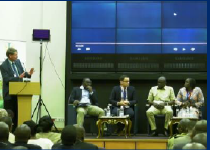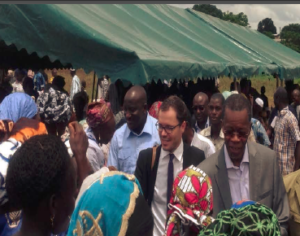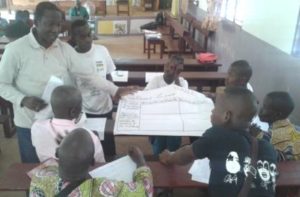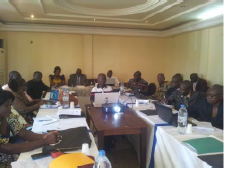Food and Enterprise Development (FED) Activity Highlights for August 1st-15th, 2015
- On August 4th & 5th 2015, USAID FED supported Zeelie Farmers Association in Lofa County sold a total of 5,879.72kg of paddy rice to the Ministry of Agriculture (MoA).
- On August 11, 2015, a total of 57 (38 male, 19 female ) Lead Farmers across the vegetable, goat and cassava value chains from the clusters in Gbehlay-Geh, Sanniquellie-Mah and BainGar district, Nimba County, were trained in nutrition based lesson plans. During the training, 1,170 copies of the nutrition flyer showing benefits of the three recommended food groups were distributed to the Lead Farmers for dissemination to group members. After the training, the Lead Farmers are expected conduct monthly interactive nutrition education sessions centered on nutrition lesson plans with their respective farming groups.
- On August 13, 2015, USAID FED’s Behavior Change Communication Specialist presented to USAID Liberia, LAUNCH, Ministry of Health and Social Welfare (MoHWS) and local LNGO, Breastfeeding Advocacy Group (BAG-LNGO) findings from the barrier analysis survey conducted. Recommendation was made by the specialist on specific activities for implementation in Nimba County on integrating nutrition into agriculture activities to improve dietary diversity.
- USAID FED collected 20 soil samples from a vegetable site in Montserrado and will be analyzed by the contracted technicians working on the soil mapping activity. This pilot program will roll out to the USAID Centers of Excellence (CoE) when the soil laboratories are operational in September 2015. An Agro Dealer in Montserrado will be identified and linked to the vegetable farming group when the soil analysis results are available.
- On August 4, USAID FED’s International Seed Policy Consultant submitted the final draft document of the Liberia Seed Regulation to USAID FED. This was subsequently submitted to the Office of the Minister of the Ministry of Agriculture for review and approval.
- USAID FED and the Ministry of Agriculture have agreed on the hiring of Alan Schroeder as the International Pesticide Policy Expert who will provide the support to the drafting of the Liberia Pesticide Regulation, which is the “domesticated” version of the ECOWAS Pesticide Regulation gazette in September 2014.
- USAID FED has commenced discussion with the West Africa Fertilizer Program (WAFP) to collaborate on the “domestication” of the ECOWAS Fertilizer Regulation and the development of the fertilizer industry in Liberia. A MoU has been drafted by WAFP and is currently being reviewed by USAID FED.



 In August 2016, the President of Côte d’Ivoire signed a decree creating a new rural land management agency. For USAID’s Property Rights and Artisanal Diamond Development (PRADD II) project, seeing its policy recommendations accepted in the final law was gratifying.
In August 2016, the President of Côte d’Ivoire signed a decree creating a new rural land management agency. For USAID’s Property Rights and Artisanal Diamond Development (PRADD II) project, seeing its policy recommendations accepted in the final law was gratifying.
